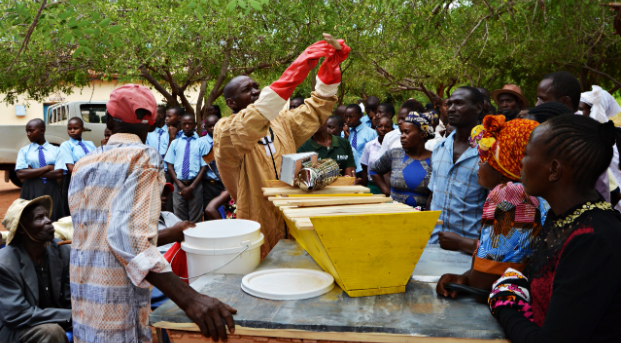
The bee population in Kitui is falling, and there is a need to increase the numbers, the county director of livestock and apiculture Joseph Kamonzo warned on Tuesday.
Kamonzo lamented that wanton environmental degradation through farm chemicals and charcoal burning had caused bee numbers to drop worryingly.
“Bee population has been threatened by human activity like insecticide spraying, massive felling of trees for charcoal production and wanton sand harvesting as well as long droughts,” he said.
Kamonzo spoke as the chief guest during the World Bee Day celebrations at the Kalivu polytechnic grounds in Athi ward of Kitui South subcounty.
The event was supported by the Nature Positive project of the National Council of Churches of Kenya in collaboration with other partners.
“Once trees are felled, it results in a lack of food for bees, which are forced to migrate to other areas or they may die. The same is the effect of the wrong use of harmful pesticides,” he added.
He called for concerted efforts to save the diminishing bee numbers as the small insects play a crucial role as pollinators, thus ensuring food security and environmental sustainability.
“Bees play a critical role in agriculture, biodiversity conservation, and rural livelihoods. Residents should ensure bees live in a conducive environment by avoiding harmful pesticides and planting flower trees,” he said.
The further said that supporting beekeeping initiatives would not only secure food systems and biodiversity for the current and future generations but also assure a seamless source of income through honey sales.
“We need to take apiculture as a commercially viable venture. We should consider it a full-time engagement as opposed to a side hustle to reap maximum benefits and income,” he said.
Findings had shown that serious beekeepers earn good and steady income. "There is money in beekeeping. A kilo of honey retails for between Sh600 and Sh1000,” he said.
He said Governor Julius Malombe's administration was keen to empower beekeepers through capacity building and training on modern techniques and the provision of gear and equipment like hives.
Andrew Nyamu, the coordinator of the Nature Positive food system project, described beekeeping as a nature based socio-economic solution devoid of any negative impact on the environment.
“This is an easy source of income for residents and is far better than the environmentally destructive charcoal burning and sand harvesting,” Nyamu said.
The Nature Positive project has already trained 30 local artisans on making the ideal bee hives.













